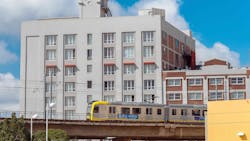L.A. Metro’s proposed $8.8-billion budget for FY23 focuses on improving customer experience
The proposed Fiscal Year 2023 $8.8 billion budget for the Los Angeles County Metropolitan Transportation Authority (L.A. Metro) will be considered during the board meeting May 26.
Here is a general breakdown of broad highlights
The proposed budget is balanced. Thanks to major one-time infrastructure investments from the federal government, L.A. Metro says it has been able to stay on track with capital projects and support ongoing customer service improvements, despite the drop in revenue on the system during the pandemic.
This budget puts a clear focus on improving the customer experience. L.A. Metro says it wants to make riders feel safe and comfortable and wants services to be convenient to travel needs. This includes improving and expanding cleaning protocols and responding to customer requests to replace all fabric seats by the end of the next fiscal year.
Safety is L.A. Metro’s top priority. The agency says it is doing more to address public safety and homelessness on the system, and to do so with compassion. L.A. Metro is boosting funding for public safety by 12.5 percent over the current year and putting that money into the Reimagining Public Safety initiative. The effort will expand transit ambassador program; grow homeless and mental health outreach activities; continue work with law enforcement agencies that help patrol the system; and add unarmed security officers to the system.
The budget is focused on ensuring that L.A. Metro’s core work in planning, transit operations and construction activities is seen through an equity lens. The agency says it is striving to ensure customers and all stakeholders can help shape projects, services and programs.
As part of its equity efforts, L.A. Metro changed the way it does its budgeting this year. L.A. Metro asked every department to start from scratch — as in zero funds — and to justify the funds they were seeking to ensure that as an organization, L.A. Metro is offering equitable access to programs and services. L,A, Metro says it thinks this resulted in a healthier budget with funding for programs that work and directly benefit customers and the region.
The budget puts two critical new lines into service. The K Line (also known as the Crenshaw/LAX Line) will offer light-rail service in the Crenshaw Corridor and eventually connect to LAX — a long-sought goal in the region. The Regional Connector is tying together the A (Blue), E (Expo) and L (Gold) Lines for quicker rail trips to and through downtown Los Angeles with fewer transfers. As part of the Connector, the agency is also opening three new underground stations in downtown that will provide easy access to Little Tokyo, the Arts District, the Civic Center, the Historic Broadway Corridor and Bunker Hill, including the many cultural offerings along Grand Avenue.
The proposed budget includes $2.3 billion for transit expansion. In addition to the two rail projects opening in FY 23, construction continues on all three sections of the Purple (D Line) Extension of the subway to Westwood, the L Line Extension to Pomona and the Airport Metro Connector — the future transfer point between Metro Rail and the LAX Automated People Mover that will take riders to the airport terminals.
L.A. Metro is continuing to fund and expand new programs that are working well. The GoPass pilot program is already providing free transit rides to more than 100,000 K-12 and community college students in L.A. County — and students have taken more than three million rides (and counting) with their GoPass. The agency also revamped the Low Income Fare is Easy (LIFE) program in the past year, offered more discounted fares and made it easier for qualified people to sign up. Since last September, more than 51,000 riders have done so. The agency says it will continue its push to get more eligible riders in LIFE in FY23 to help riders who depend on transit the most.
Funds not just for L.A. Metro
This isn’t just a budget for L.A. Metro — the proposed budget includes $1.9 billion in funding for other transportation agencies in L.A. County and another $273 million for regional rail — which includes Metrolink, the commuter rail agency that connects Los Angeles, Orange, Riverside, San Bernardino and Ventura counties.
The budget also includes $634 million for the highways program that continues to work to ease chokepoints that worsen traffic congestion.
The ongoing COVID-19 pandemic has been tough. The more than $1 billion provided to L.A. Metro in federal relief funds from the American Recovery Plan Act has been critical to keeping L.A. Metro stable and avoiding layoffs or drastic cuts to services.
Like other transit agencies across the world, L.A. Metro says it is working to rebuild ridership and adjust to post-pandemic life and changing commuting habits and realities. The agency adds it has been able to continue to make progress on several fronts as it works to make getting around easier for everyone in L.A. County.
The budget for FY23 is a one-year snapshot; it’s the financial roadmap that seeks to balance investments in the current and future mobility needs of L.A. County and surrounding region. Service improvements, capacity enhancements and region-wide partnerships all strive to reduce congestion and pollution, improve mobility and continue to make Los Angeles County a better place to live, work and play.


